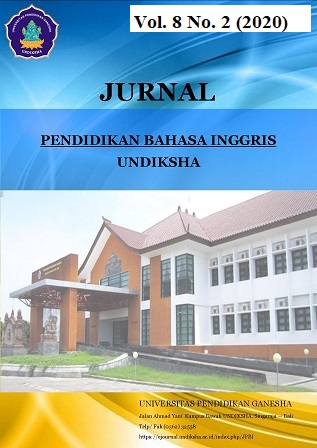AN ANALYSIS OF LANGUAGE EXPRESSIONS FOCUS IN “WHEN ENGLISH RINGS A BELL” FOR JUNIOR HIGH SCHOOL STUDENTS YEAR VIII
DOI:
https://doi.org/10.23887/jpbi.v8i2.31735Abstract
This study aims to describe of expressions that used by students contained in “When English Rings a Bell” textbook of eighth grade students. The expressions used by the speakers to express a massage, thoughts, feelings, or opinions to other people. People must use certain expression depend on the situation. This study used qualitative research design because all the data get from words not numbers. The writers used conversation from the book as a source of the data. The result of the study shows that the expressions contained in textbook When English Rings A Bell fits with the situation, what and when they want to speak. The kinds of expressions can be conveyed through expression in this study is how to ask and give attention.
References
Chaer, A. (2010). Kesantunan Berbahasa. Jakarta: Rineka Cipta.
Reksoatmodjo, T., N. (2007). Statistika untuk Psikologi dan Pendidikan.Bandung: Refika Aditama.
Hoskisson, K. & Tompkins, G. E. 1987. Language arts: content and teaching strategies. Melbourne: Merill Publishing Company.
Ibnu Hadjar. 1996. Dasar-Dasar Metodologi Penelitian Kuantitatif dalam Pendidikan. Jakarta: Raja Grafindo Persada.
Anna Sotter. 2008. Practicing English Speaking Skill through Small Group Discussion. Ohio State University Press.
H. Nashar. 2004. Motivasi Siswa dalam Proses Pembelajaran. Jakarta:Ghalia Indonesia.
Downloads
Issue
Section
License
Authors who publish with the Jurnal Pendidikan Bahasa Inggris Undiksha agree to the following terms:- Authors retain copyright and grant the journal the right of first publication with the work simultaneously licensed under a Creative Commons Attribution License (CC BY-SA 4.0) that allows others to share the work with an acknowledgment of the work's authorship and initial publication in this journal
- Authors are able to enter into separate, additional contractual arrangements for the non-exclusive distribution of the journal's published version of the work (e.g., post it to an institutional repository or publish it in a book), with an acknowledgment of its initial publication in this journal.
- Authors are permitted and encouraged to post their work online (e.g., in institutional repositories or on their website) prior to and during the submission process, as it can lead to productive exchanges, as well as earlier and greater citation of published work. (See The Effect of Open Access)













